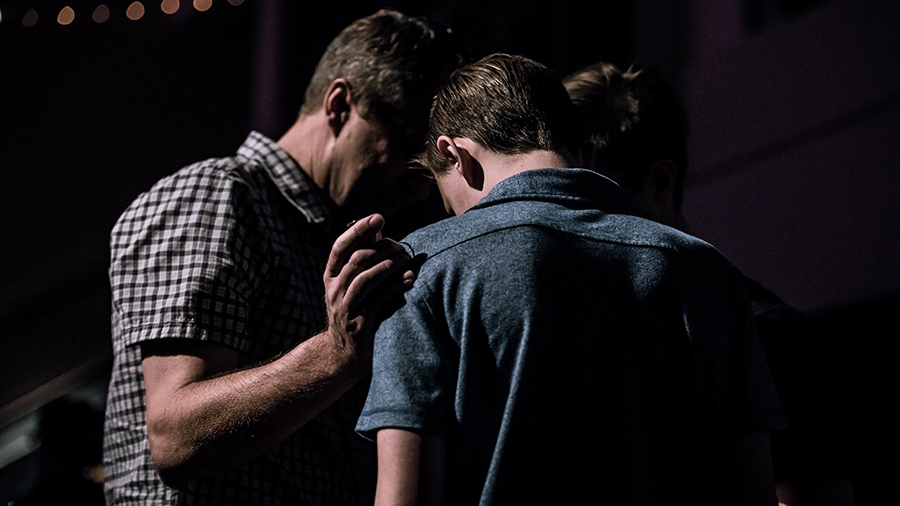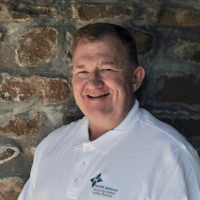"Phil, we are flying tonight without true VFR. We have a few set checkpoints that you can help me spot visually, but tonight, we are mostly flying instruments on vectors. Do you know what that means?" Dr. McDaniel asked me.
"That means we are flying straight lines in a set direction, right?" I asked. "But, how do you know when to break off that vector and go another direction?"
My friend explained that while vectors pointed us in a specific direction, we were flying in a lot of wind. If he flew the plane perfectly straight, we would gradually drift off our vector because we were part of the moving air mass on a different course. The vector gave us a target direction. However, he would need to make hundreds of minor corrections to keep us pointed at the beacon. Otherwise, we would drift off course. My job was to help him locate visual, lighted, locations along our way that would be his confirmation at night that our heading was correct. "I always want some form of visual confirmation if I can get it even when I'm flying by instruments."
The, "part of the air mass," statement has stuck in my brain now for 44 years. We like to think we are not caught up in our culture. However, culture moves us off course from Jesus' way of life in a myriad of tiny directions that we seldom recognize. We are part of the "air mass of culture." The winds of culture push and pull us off course if we don't make constant adjustments.
One of the most significant ways we are part of our cultural drift is in our sense of individualism. When we read many of the Bible's teachings, we hear them as commands to us as individuals. Many, however, were not given to us as individuals. They speak to us as a member of a group of disciples.
The English language can make the problem worse. I kid folks all over the world that Texas English is the purest form of English. We speak more slowly so people can easily understand us. We also distinguish between "you" singular and the "you" plural - "y' all."
Much of Jesus' teaching and many of Paul's instructions were given as "y' all" commands, not individual "you" commands! We hear these commands as individual commands because we can't hear the plural "y' all" in our English translations. "You need to pray," should mean something very different: "Y'all need to pray"!

Made for Life Together
Before you quit reading because you think I'm just another arrogant Texan, go back and remember a few things from Scripture. See the many blessings we miss because the "you" in Scripture is often, "y' all"! We were made for life together - especially, spiritual life.
Can you remember the first thing said about human beings in the Bible?
Then God said, "Let us make humankind in our image, according to our likeness..." (Genesis 1:26 NRSV - Underline added for emphasis.).
God made us, each one of us, to be like him: we are unique people designed to be connected to others. God - as Father, Son, and Holy Spirit - has always lived in communion and fellowship. We should not be surprised at what God said next about the male person at creation:
The Lord God said, "It is not good for the man to be alone. I will make a helper suitable for him." (Genesis 2:18).
God has always existed as Father, Son, and Spirit. He made humans like him; fashioned in his image. When God formed the male person of creation, the Creator declared that it wasn't right for the isolated human to be alone. He needed someone like him, but different from him.
God creates some people to be single and to serve him with a specially focused purpose - their gifted to be single (1 Corinthians 7:7-9; Matthew 19:10-12). However, God wants those who are gifted in this way also to be in relationship with others. In Christ, God gives us friends, partners in ministry, and encouragers. They are our brothers and sisters in Christ with whom we can say, "Our Father"!
The Spirit of God taught us this in poetic form through the wisdom literature of the Old Testament:
Two are better than one,
because they have a good return for their labor:
If either of them falls down,
one can help the other up.
But pity anyone who falls
and has no one to help them up.Also, if two lie down together, they will keep warm.
But how can one keep warm alone?Though one may be overpowered,
two can defend themselves.
A cord of three strands is not quickly broken (Ecclesiastes 4:9-12).
Jesus believed the importance of his disciples being in fellowship with other disciples. He emphasized the principle of his disciples ministering as a team of twelve apostles (Mark 3) as well as by sending them out two-by-two to do ministry (Mark 6:7; 10:1). The apostle Paul practiced a similar ministry of involving others, both men and women in ministry outreach (Acts 15-16). Jesus intended that we live our lives as disciples with the help, encouragement, and presence of other disciples.
Jesus included the importance of gathering together for prayer as part of his teaching on building authentic community:
For where two or three gather in my name, there am I with them" (Matthew 18:20).
Something much more potent than fellowship and sharing pious-sounding words happens when believers prayer together: Jesus is present!

Prayer as a Together Experience
Jesus' teaching on prayer lies in the middle of the Sermon on the Mount (Matthew 6:5-8) because prayer is so central to living as a disciple of Jesus. While prayer is often a "together experience" frequently in Scripture, we are certainly also called to pray personally. Prayer in Scripture is frequently individual and personal. Last week, we looked at Jesus' teaching on individual, personal prayer.
However, Jesus' teaching doesn't end with his teaching on personal prayer. When we begin to dig a little deeper, we then begin to realize that many of the Bible's exhortations for us to pray are addressed to "y' all," not to the individual "you" - these teachings on prayer are about "together experiences."
Jesus' use of the pronouns "our" and "us" and "we" signaled this shift from personal to shared prayer. Jesus gave his disciples a model prayer for them to use for their prayer life together. Jesus gave us this shared prayer to join with other believers as we gather in the presence of "our" Abba Father. Jesus intended this as a "y' all" prayer, a group prayer, because of those repeated plural personal pronouns - see them highlighted in bold in The Prayer of Jesus below.
[Jesus taught his disciples:] "Pray then in this way:Our Father in heaven,
hallowed be your name.Your kingdom come.
Your will be done,
on earth as it is in heaven.Give us this day our daily bread.
And forgive us our debts,
as we also have forgiven our debtors.And do not bring us to the time of trial,
but rescue us from the evil one."
Many believers pray this prayer individually. Think of the power, the sense of being together in our spiritual walk with Jesus, that we lose in not saying The Prayer, together. We pray together as adopted children welcomed into the presence of "our" Father. How does that not call us to reconcile with each other and be more gracious with each other? We pray about "our" bread needed for the day. So, imagine how the Holy Spirit could use The Prayer to open our hearts toward those among us who need help with food and other basic needs. Then, the Lord could convict us of our need to forgive others in our immediate fellowship before we ask for him to forgive our sins. We could be led to intercede for each other in our areas of weakness and temptations. We could uphold each other as we work to overcome the evil one through the Lord's power. We could feel the call to reclaim those who have fallen captive to temptation, sin, and addictive enslavement of the evil one.
When taken seriously as a "together prayer," Jesus' model prayer has energizing power to re-make us as an authentic family, a genuine fellowship, and the transformative kingdom-people of God!

As I have traveled all over the United States and to nearly every continent these last few years, I find a deep hunger to connect with God in prayer. However, that yearning is mostly about growing in power through individual prayer. We must not lose touch with this deep connection to God in prayer that occurs with others in a group.
Some talk as if it is always better to get away from the messiness of life and crawl into a spiritual phone booth and cocoon themselves from their flawed and distracting brothers and sisters. Jesus often withdrew to lonely places before the sun came up and prayed with his Father. He also prayed for and with his disciples. And as we focus on The Prayer, we know he taught us to pray, "Our Father…"
On a recent Sunday over lunch, a church leader said to me, "Phil, I'm concerned that there isn't a passion for more prayer in our group meetings. And not just our meetings, where are the elders of our church leading us into deeper prayers at all of our meetings?" I believe his concern is well-placed! We must not forget the core work we do together as disciples is praying together. Unfortunately, I fear I have been part of the neglect.
Jesus' early church leaders didn't neglect group prayer. When Paul wrote his churches about their problems, he framed them with prayer - beginning, end, and middle. (See these for examples: Ephesians 1:17-19; 3:14-21; 6:23-24; 2 Thessalonians 1:11-12; 2:16-17; 3:16-18.) These letters, along with Paul's prayers, were shared in the assembly of those churches.
In other words, Paul's prayers, like the Psalms, were their congregational prayers. Paul's passion for shared prayers - "y' all" prayers and together prayers - were rooted in his training to be a Rabbi. He grew up praying the Psalms. He also had to know about Jesus' promise to be present when two or three of his disciples gathered together and called on his name together, in prayer (Matthew 18:20; cf. 1 Corinthians 1:2; 5:4).
How much power do we lack today because we don't gather to pray together more?
How often do we miss the presence of the Lord Jesus among us because we have not taken time to pray together?
Jesus taught us that prayer is a "y' all" thing, not only a singular "you" thing. The early church knew that and took advantage of this powerful grace (Acts 4:23-24). When they did, Jesus changed them. Through them, the Lord then changed the world (Acts 4:31; 17:6):
After they prayed, the place where they were meeting was shaken. And they were all filled with the Holy Spirit and spoke the word of God boldly (Acts 4:31).

As we will do each week with our series on prayer, a friend and ministry partner will give us some added insight and a prayer exercise. These exercises are for us to use and grow in our regular engagement with the Almighty God, our Abba Father, in prayer.
This week, a long-time friend and partner with Hope Network Ministries, Grady King,[BIO] provides a very practical way to put into practice our need for prayer as ministry work!
Why is it so hard for us to see prayer as the essential work of ministry? Why don't we more consistently invite God to work on us, work through us, and empower our work through shared prayer?
Making it Real: Called to God, Together - "Our Father…"
By Grady King
The Time: 7 PM after a long day.
The Place: Classroom in the church building or a house or a coffee shop
The Occasion: Ministry Meeting, Small Group Meeting, or a Family Devotional Time
The Agenda: Whatever
The Question: What must we get done at this meeting?
When the disciples asked Jesus to teach them to pray, he began with the plural, "OUR Father in heaven." But it wasn't just Jesus who had this emphasis on praying together - although that should be enough - look a little deeper. Prayer punctuates the story of the early church and Luke’s accent on prayer is communal - “They devoted themselves to prayer..." (Act 1:14; 6:4; 14:23; 16:16, 25).
Functioning in a ministry group is not easy. After all, we are all "volunteers." Somewhere between the opening and closing prayer is the challenge of being a group; of actually functioning together. The diversity of opinions, experiences, personalities, and varying degrees of trust is always present. Predictable patterns exist and vary depending on the topic of discussion. Here are some predictable models: the incessant talker, the quiet one, the "slippery slope" representative, the "let's study it more" teacher, the "keep people happy" lobbyist, and the "we never make a decision" pragmatist. How would you describe how the group functions? Will you be the one that calls the group to prayer as a part of the ministry meeting?
Praying together calls us together in spiritual community. As Jesus' people, wherever two or three gathers, God is present (Matthew 18:20). As Phil mentioned above, the wisdom of Solomon provides a backdrop for our praying together: we are better, stronger, warmer, and more productive, together (Ecclesiastes 4:9-12)
This principle is especially true of prayer. Communal prayer is powerful. However, it is hard work calling you beyond comfort. It challenges us to embrace courageous spiritual growth and personal vulnerability. When diversity polarizes, tension mounts and emotions tend to take over. One of three instinctual responses usually predominate, but in a group, all three are typically present: fight, flight, or freeze.
Instead, what would praying together look like?
How would it break our instinctive responses?
How would it help us overcome our well-worn ruts and repeated scripts we live out in our groups?
So, why wait for times of polarization or desperation to reach for prayer. What if we made prayer a fundamental rhythm of every meeting? And, what if the prayers we prayed were the very prayers of Scripture? What if these Scripture prayers directly applied to our group and our mission at hand? Couldn't the prayers help shape our thoughts, orient hearts, and influence behavior? Couldn't these prayers invite the Holy Spirit to do something in and with us as a group? After all, Scripture is clear; the Spirit of God lives in the people of God (Romans 8:9-14; 1 Corinthians 2:11; 12:13; Ephesians 4.30). Let's refuse to limit our prayers to the routine beginning and end of meetings. Let's do more with prayer than to break the gridlock of disagreement. Let's make prayer the foundation beat around which we orient the rhythm of our meetings. And, let's include prayers from Scripture to help us express things that God's people needed to pray for centuries.
The Practice of Praying Together
The following prayer is to be a part of the meeting agenda, not merely an opening or closing prayer. It can be done 2-3 times throughout the meeting in various ways: in unison, by one person, or rotating to someone else by line. You could even pray with your eyes open, making eye contact with a person. And, the group could be you and a friend, you and your small group, you and a Bible class, you and your family. Remember, Jesus said, "Where two or three are gathered together in my name... "!
For this reason, since the day we heard it, we have not ceased praying for you and asking that you may be filled with the knowledge of God's will in all spiritual wisdom and understanding, so that you may lead lives worthy of the Lord, fully pleasing to him, as you bear fruit in every good work and as you grow in the knowledge of God. May you be made strong with all the strength that comes from his glorious power, and may you be prepared to endure everything with patience, while joyfully giving thanks to the Father, who has enabled you to share in the inheritance of the saints in the light. He has rescued us from the power of darkness and transferred us into the kingdom of his beloved Son, in whom we have redemption, the forgiveness of sins (Colossians 1:9-14 NRSV).
A Shared Communal Prayer for our Spiritual Practice This Week
Lord, fill us with the knowledge of your will.
Give us spiritual wisdom and understanding.
Help us lead lives worthy of you and please you fully.
May we bear fruit in every good work and grow in our knowledge of you.
We seek your strength, the strength that only comes from your glorious power.
Help us endure everything with patience as we joyfully give thanks to you, our Father.
We praise you for enabling us to share in the inheritance of your saints in glorious light.
May we live as people rescued from the power of darkness and as part of the kingdom of your beloved Son, who has redeemed and forgiven us of our sin.
In the name of Jesus Christ, our Lord, who calls us together. Amen.
 Grady King, D. Min, serves as V. P. and Co-Leader of HOPE Network, doing work in mentoring leaders, guiding churches and interim ministry. He also serves as Director of Church Resources at Oklahoma Christian, part time. He was involved in congregational ministry for over 40 years with 26 of those years in two congregations: Mansfield Church of Christ and South MacArthur Church of Christ, Irving, TX. Grady received his formal education at Oklahoma Christian and Abilene Christian (B.S. in Education; M.S. Biblical Studies; D. Min). He and his wife, Karen, were married in 1979 and have two married children: Josh and Carolyn King; Christin and Chad Paradowski. Grady’s writing includes blogs for HOPE Network, chapters in various books: HOPE for Weary Leaders; When Leaders Are Stuck: A Guide to Communal Discernment; and, A Bully on the Playground: Courageous Strategies for Dealing with Bullies in the Church and Leadership.Contact Grady at grady@hopenetworkministries.org.
Grady King, D. Min, serves as V. P. and Co-Leader of HOPE Network, doing work in mentoring leaders, guiding churches and interim ministry. He also serves as Director of Church Resources at Oklahoma Christian, part time. He was involved in congregational ministry for over 40 years with 26 of those years in two congregations: Mansfield Church of Christ and South MacArthur Church of Christ, Irving, TX. Grady received his formal education at Oklahoma Christian and Abilene Christian (B.S. in Education; M.S. Biblical Studies; D. Min). He and his wife, Karen, were married in 1979 and have two married children: Josh and Carolyn King; Christin and Chad Paradowski. Grady’s writing includes blogs for HOPE Network, chapters in various books: HOPE for Weary Leaders; When Leaders Are Stuck: A Guide to Communal Discernment; and, A Bully on the Playground: Courageous Strategies for Dealing with Bullies in the Church and Leadership.Contact Grady at grady@hopenetworkministries.org.












Comments
Have thoughts on this article? Leave a comment